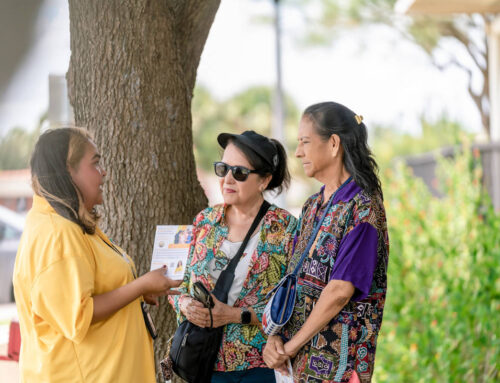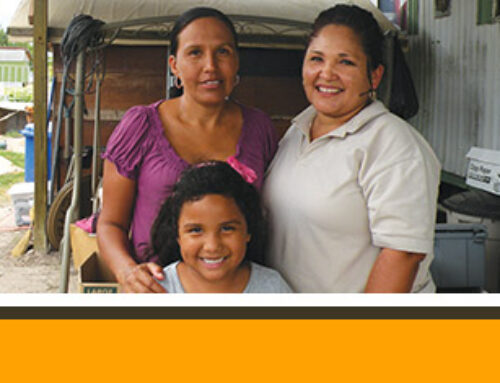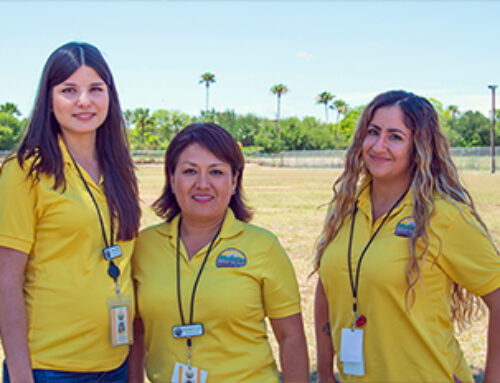MHP Salud’s Navigator Program Director Talks Health Insurance, Open Enrollment, and Application Assistance in the Rio Grande Valley
Published November 2020 | Back to all news and updates
From November 1st – December 15th MHP Salud Navigators help hundreds of individuals apply for health coverage across 15 different counties in the Rio Grande Valley (RGV) of South Texas. Outside of special enrollment periods that require individuals to meet certain qualifications, Open Enrollment is the only time that individuals can apply, or make changes to existing coverage. Additionally, there is a great need for insurance enrollment assistance in the RGV due to social and environmental factors unique to the region that create challenges for individuals navigating the complex insurance process.
Approximately one-third of Hispanic residents do not
have health insurance in the RGV region.1
We had a chance to speak with Cristina Leal, who manages a team of Community Health Workers trained as health insurance Navigators through MHP Salud’s Connect to Care Initiative for the last two years. Her time here has given her a deep understanding of the challenges individuals face in this region.
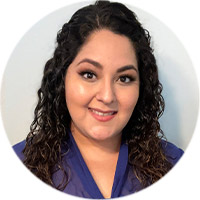
Cristina Leal
Program Director | Navigator
Who are Navigators?
Community Health Workers certified as Navigators help individuals apply for health insurance, but a lot what they do also involves assisting consumers that are already enrolled in coverage.
What kind of services do they provide, and to whom?
They often resolve issues like application errors or issues with carriers. Some other common services include: helping consumers obtain an insurance ID card, connecting consumers to Insurance Representatives so that that they can make payments, and providing consumers with information on primary care providers.
Why are these services such a need for this community?
These services are needed because many communities along the border are underserved and often left behind. We provide a bridge to help connect people to health care coverage that otherwise might not be there. Not to mention, our services are provided for free – and, Navigators provide additional health care resources. This combination helps address the lack of access to information, lack of technology and lack of bi-lingual support offered in these communities.
How do you make the community aware that services are available?
We go to locations where we know where people are most likely to qualify, for example, clinics. We often establish connections where they will refer individuals to us. We’ve also done a number of presentations at worksites. Employers will contact us and we’ll come in and provide information and answer questions for their employees.
Why do the individuals who work as Community Health Workers also serve as great Navigators?
CHWs know the needs of their community and aware of what local resources they can connect people to. If individuals don’t qualify for health care coverage, they’ll have the knowledge to connect individuals to other resources.
Why is Open Enrollment such an important time-period?
Open Enrollment is a short period of time and it’s the only time people are allowed to look at plans and make changes. Other than that, there are special enrollment periods but it depends on qualifying factors. Also, right now with the coronavirus pandemic, it’s especially important to have health coverage within these communities We know that our population includes a lot of individuals with underlying conditions which puts them more at risk for COVID-19. Having access to preventative services is crucial.
How do your Navigators prepare for Open Enrollment?
Navigators are trained and certified on a yearly basis. They also participate in local training on different health care plans and policy updates. This assures they have the most accurate information before helping people through the application process.
What upcoming outreach activities do you have planned?
We’re doing our first virtual phone bank with local tv stations here in RGV. One of our Navigators will be interviewed during multiple news broadcasts in which they will provide a phone number individuals can call to get the help they need. With COVID, door-to-door outreach has been a challenge so we got creative and set up yard signs and put door hangers with our information on doorknobs. And to ensure we don’t miss anyone during the hectic season, we will continue to push our efforts after the holidays with another phone bank and more outreach.
Can you briefly talk about how you manage to make sure every individual in the community receives service during such a busy time of year?
To put it simply. We have 15 fully trained Navigators, spanning the 15 counties, and working overtime. Additionally, we have the support of other projects and MHP Salud staff.
What are the most common misconceptions you hear about the application process?
We often hear that the application is too confusing and that technology is a barrier. A lot of the form and information is online and a lot of our community members either don’t have reliable access or they’re not tech-savvy enough to navigate the system.
Also, there is a mistrust in the community of the system because of fraud. With our elderly population, we often hear that they’ve been signed up for plans without their knowledge or without knowing the full details. We make sure to take our time with every person we talk to. And, each individual gets a copy of all the information that was covered.
Where do these misconceptions come from?
It can come from a lack of understanding of the system and a distrust of government systems in general. Attitudes around health within the Hispanic culture can contribute as well. We tend to wait until the last minute or we’ll determine our health issue is not a big deal so we don’t seek out health care. Most of all I think past experiences with other individuals coming into the community and signing people up for plans they didn’t want, play a role in creating misconceptions around the health care application process. Navigators provide information and education to help assure individuals they’ll get the help they need.
What are the biggest challenges individuals face when it comes time to fill out applications?
The actual filling out of the application is challenging. Trying to understanding forms and having to use web-based technology to fill them out is a challenge. We find that most people feel comfortable having someone there to help. Also, the Navigators can help explain certain questions like “What is your income?” and how the answer to these questions impact your application.
How has the project impacted you as an individual? What about the Navigators?
For me, it gives me a sense of fulfillment. I enjoy being able to be part of a project that directly helps the community. It makes the job more meaningful. I also like the fact that we provide information that helps individuals make their own decisions. It really helps us push the needle forward in terms of helping Hispanics and Latinos gain the knowledge they need to navigate the health care system and advocate for themselves.
MHP Salud’s Navigator Project has helped individuals for over 13 years.
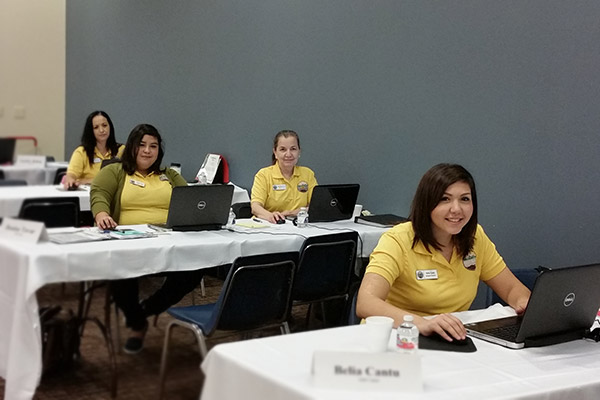
In 2019, the Navigator project helped over 1000 individuals enroll in a Qualified Health Plan. Navigators also helped connect people to a wide array of services to address challenges that prevent individuals from getting the health care they need. Further, a majority of those who received services reported that they had learned something new or now had the confidence to make an appointment with a primary care provider.
Learn more about how we’re improving health care access in underserved communities with our Connect to Care Initiative.
- Health Care Access in the Rio Grande Valley: The Specialty Care Challenge October 2018 http://www.lrgvdc.org/downloads/packets/5C1-01-30-2019.pdf
Blog Topics
About MHP Salud
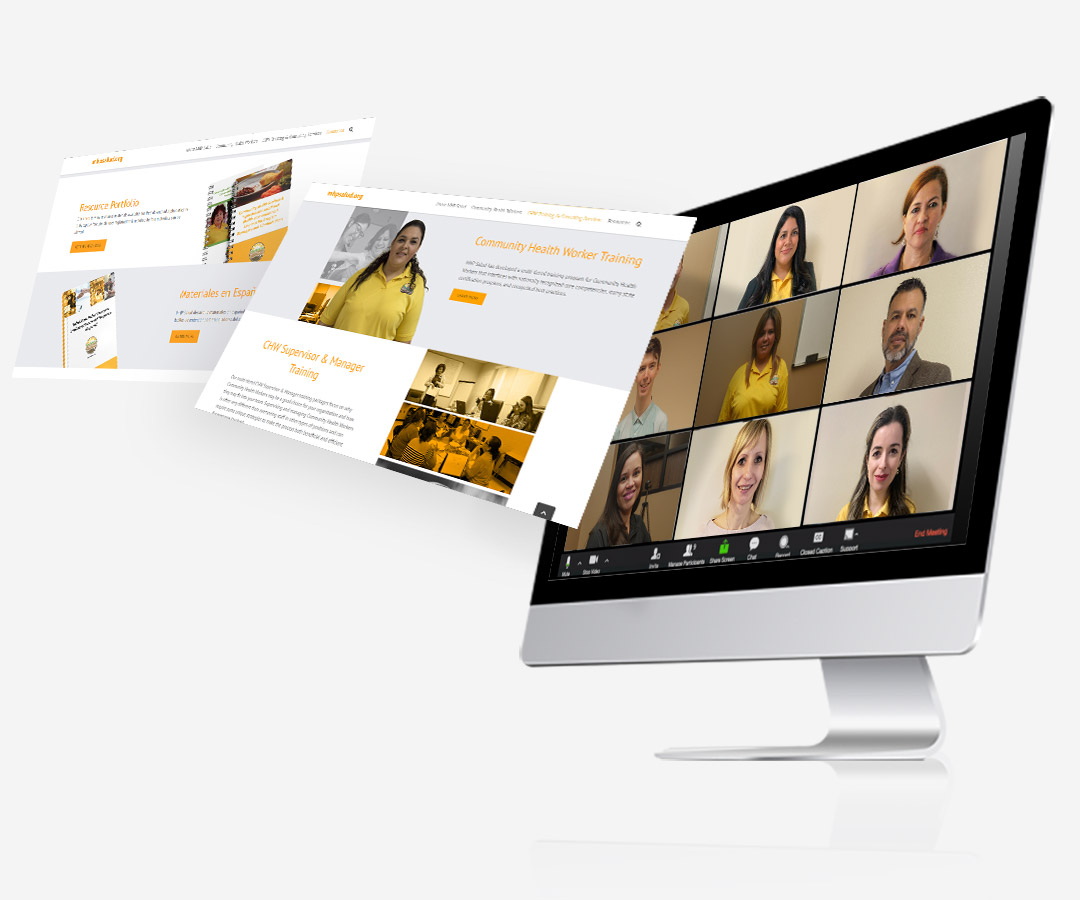
MHP Salud has over 35 years of experience implementing CHW programs and training organizations looking to start and/or strengthen their own CHW programs. Visit our CHW Training & Consulting Services page to learn more about how we can help.

